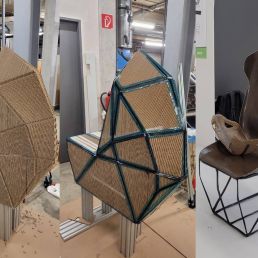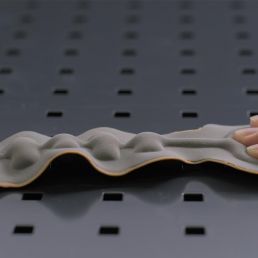
3D printed salmon alternative
Israeli startup presents plant-based fish product
19 January 2022
Six-month-old food tech company Plantish has developed a plant-based alternative to salmon with the same nutritional value as fish but without the toxins, antibiotics, microplastics and traces of mercury commonly found in salmon. The Plantish product can be prepared in the same way as regular salmon. The product is expected to be commercialized by 2024.
Appearance, taste and texture of salmon
The Israeli startup unveiled the prototype on January 13, 2022 and announced that it had developed patent-pending 3D printing technology to produce plant-based fish alternatives on a large scale and at low cost.
“Using the right plant proteins to reach the fibrous strands designed to replicate the complex texture of animal muscle is key to being able to capture the experience of eating salmon, and doing this on a large scale makes it a viable surrogate.” for gastronomy, restaurants, and retail,” it said.
Plantish was founded in mid-2021 by Ofek Ron, former General Manager of Israeli organization Vegan Friendly, who serves as CEO; dr Hila Elimelech, PhD chemist and expert in additive manufacturing technology, Dr. Ron Sicsic, Dr. Ariel Szklanny and Eyal Briller, a former product director at US meat company Impossible Foods.
Ofek Ron said in a statement that the Plantish mission is of great importance to the founding team. “We exist to save the oceans and eliminate the need to eat seafood by providing more sustainable and nutritious fish options.”
Plantish has raised $2 million in a pre-seed round. “Our vision is to be the #1 seafood brand in the world without hurting a single fish,” added Ofek Ron. “Our plant-based salmon product is slated to launch at select pop-up locations by the end of 2022. We are targeting official launch in 2024.
According to a June 2021 report by the Good Food Institute, Plantish is one of around 90 companies around the world involved in the plant-based seafood industry. About a dozen are developing cultured seafood or fish from animal cells. According to market research firm IMARC, companies offering alternative seafood products grew by 30 % between 2017 and 2020.
New companies are entering the market. For example, Spanish company Mimic Seafood launched a tomato-based tuna product last year, while US startup Ocean Hugger Foods launched a plant-based alternative to raw tuna and raw eel for sushi in 2019.
And even large food companies have already recognized the market development. The Swiss food company Nestlé, for example, launched a plant-based tuna product called “Vuna”. The Thailand-based manufacturer of seafood products “Thai Union Group” launched the plant-based meat line “OMG Meat” in 2021. This includes crab cakes and fish burgers, which are sold to retailers and restaurants. American food giant Cargill partnered with Japan-based convenience store chain Lawson in 2020 to introduce a line of plant-based products, including vegan scallops.
“The market for plant-based seafood is still small compared to the plant-based meat industry” (Good Food Institute). Sales could “grow by $221 million” in the coming years and create more new businesses and innovations.
www.plantish.com
www.mimicseafood.com
www.oceanhuggerfoods.com
www.nestle.com
www.omg-meat.com
image source: Plantish
Ecoblaq molecular wood colours
23 March 2024
Ecoblaq is a molecule manipulation method, a natural chemical reaction, making…
Natural fiber reinforced car seat
22 October 2023
The focus of the project "Design for Recycling" is a seat shell that is made…
MotorSkins morphing textiles
19 April 2022
Berlin based start-up MotorSkins designs and produces textiles with embedded…
3D Pioneers Challenge 2022
15 December 2021
The 3D Pioneers Challenge 2022 adresses tech pioneers who pave the way for…
IGNIS – Light from waste heat energy
12 August 2020
The availability of affordable, independent and, above all, clean electrical…
Brake disc with reduced fine dust
21 April 2021
Fine dust endangers our health. One of the main sources is traffic, especially…
Texoversum
15 July 2023
With the "Texoversum", Reutlingen University has put into operation a training…
Invisible Terracotta Solar Rooftile
10 May 2023
The family-run business Dyaqua has developed a technology to integrate a…
Xarvio – Digital Farming
8 January 2021
BASF Digital Farming GmbH has received the renowned Crop Science Award for the…








